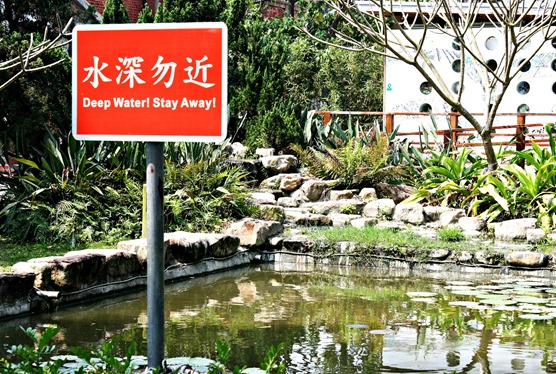Fortunately, this sign has English. Deep water. Three feet. Oh noes!
I’m not going to try and teach you much myself. That’s just silly, considering there are so many fantastic resources out there. The problem comes when you have infinite choices and have to keep it manageable. If you’re only staying a short time, obvious phrases like, ‘hello,’ ‘thank you,’ and so on are a must.
Also keep in mind that the Taiwanese speak a different version of Mandarin than Mainlanders. Think of it like British vs. American English. Not a different language, per se, but the accent and slang can be enough to make them mutually unintelligible if it’s not your native tongue.
But what about beyond that? Want to know if someone is talking about you? What about words to avoid?
Here are a few tips (like four, woooot). At the very least, you can look for these words in your language course or class or book or whatever and learn how to say them properly.
American – “mei-guo-ren” (may-gwo-ren)
Foreigner – “wai-guo-ren” (why-gwo-ren)
(These two are good for when you’re on a bus and the people around you are talking about you. If you hear this and you’re the only white person, turn and smile at the speaker. They will assume you know what they’re saying. I don’t mean this in a rude way, to get the jump on the unsuspecting locals. I just don’t particularly like being talked about like that. But most people rightly assume that foreigners don’t speak Chinese, so it does happen. But please return the favor and don’t talk about people in English either. More of them will speak it than you realize, and most are too polite to make it known.)
You don’t understand – “(Ni) ting bu dong.” (Nee-ting-bu-dong)
I understand – “Wo ting de dong.” (Whoa-ting-duh-dong)
(I used this a lot in class, when the kids would be making fun of us, then assuming we didn’t understand. Scared a few of them, I think, when I told them I could.)
One of the biggest differences you may notice between the Chinese you learn from resources like Pimsleur or Rosetta and Taiwanese Mandarin is the “r” sound at the end of many words. For instance, in Mainland Chinese, you’ll hear them say “yi-diar” (ee-dyar) – meaning ‘a little.’ But in Taiwan, you’ll hear it as “yi-dian” (ee-dyen). There are many more examples, but this was the first case I noticed.
Also, note that you should avoid saying “cow” and “gun” (in English). Not that these are offensive in and of themselves, but they sound very close to two swear words in Chinese. Just keep on your guard. I still have a hard time saying them now.
I think I’ll make a brief guide to ordering milk tea next. It’s the lifeblood of Taiwan, and I want you to have some, but few places speak enough English to make it well.
otter.
